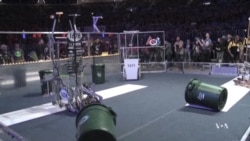Call it the geek Superbowl. Six-hundred and eight teams of high school students from 40 countries competed last week in St. Louis, Missouri, to build robots capable of performing tasks related to recycling. Each team had to use the same set of parts and were given only weeks to build their robots.
A crowd of 40,000 cheered while the competitors nervously watched their robots maneuvering around the field with almost athletic precision, picking up empty recycle bins and stacking them in designated areas, with a trash can balanced on top.
It's been like this since 1992, high school teams, robots and their fans gather on Einstein Field, in St. Louis, Missouri, for the annual world championship, For Inspiration and Recognition of Science and Technology, known by its acronym, FIRST.
Robots had to catch and dispose of plastic pool noodles representing trash.
Like any competition there was the agony of defeat ... breakdowns, with teams working feverishly to repair their robots and get them back on the field.
But with championships in eight subdivisions, there were also plenty of winners.
Christopher Pulicken was the driver for Team 118, “The Robonauts,” a part of the winning alliance.
“I feel amazing right now," he said. "We have been striving to get this world championship for 18,19, 20 years and counting. It's always escaped us but now, now it hasn't.”
The competition began with local and regional events, and the most advanced teams came to the U.S. to compete in different challenges.
These games got Bethany Rispoli, of Team 225, “Tech Fire,” into science and math.
“It showed me that engineering, technology, science and math can be so much more than just paper doing problems," she said. "It showed me that it can be exciting, it can be just as fun as any sports any time.”
The technical mentor for Team 254, E.J. Sabathia, started as a member of the same team 15 years ago. He's now an engineer at Tesla Motors.
“I want these kids to be able to see professionals doing those things day in and day out," he said. "See that we're normal people and see where they can go.”
Another engineer who started as a teenage robot competitor in FIRST is Mason Markee, who now works at NASA.
“My whole lab is full of old FIRSTers," he said. "You know, people who have done this before. That makes an incredible thing .. We just got a trophy out here. Isn't that awesome?”
This year’s coveted FIRST Robotics Competition was won by one team from Texas and three teams from California.







